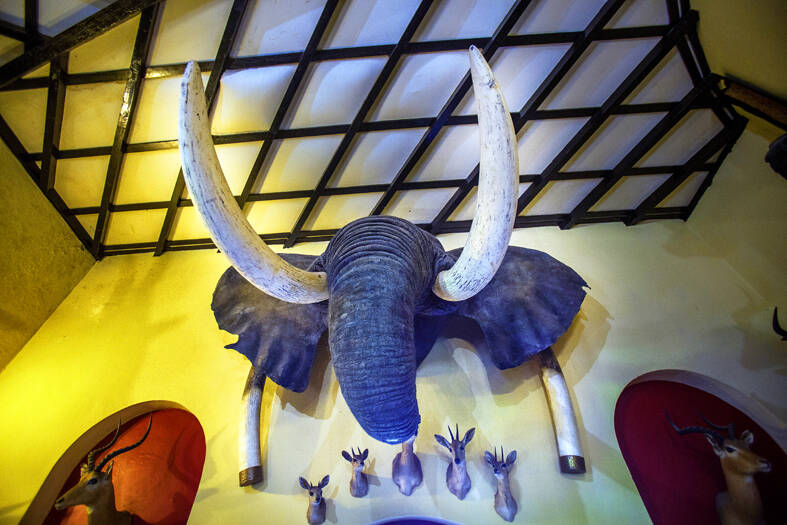More than one-fifth of the world’s migrating species are at risk of going extinct as a result of climate change and human encroachment, the UN’s first-ever report on migrating animals published yesterday said.
Billions of animals make journeys across deserts, plains or oceans every year to breed and feed, and “unsustainable” pressures put on migratory species could not only see their populations dwindle, but also disrupt food supplies and threaten livelihoods, the report said.
Of the 1,189 species covered by a 1979 UN Convention on the Conservation of Migratory Species of Wild Animals, 44 percent have seen numbers decline, and as many as 22 percent could vanish altogether, the report added.

Photo: AP
The numbers were based on assessments and data provided by the International Union for the Conservation of Nature as well as the Living Planet Index, which collates population numbers for more than 5,000 species from 1970 onward.
The report gives “a very clear direction” about what governments need to do to tackle the threats to migratory species, UN Convention on the Conservation of Migratory Species of Wild Animals executive secretary Amy Fraenkel said.
“It’s always about implementation,” she said ahead of the convention’s meeting in Samarkand, Uzbekistan.
The convention opened yesterday and is to run until Saturday.
Humans pose the biggest threat, with activities including hunting, fishing and other forms of overexploitation impacting 70 percent of the species on the UN list.
Habitat loss affected up to 75 percent of the species — underlining the need for more connectivity between isolated ecosystems.
The report’s authors urged governments to avoid disrupting habitats and migration paths when installing infrastructure such as dams, pipelines or wind turbines.
“We need to look at the top levels of government decisionmaking and what is being planned so that we can make sure that we can ... address human needs while not sacrificing the nature we all need to survive,” she said.
The pressures are being compounded by temperature changes, which disrupt the timing of migrations, cause heat stress and drive increasingly destructive weather-related events such as droughts or forest fires.
“The changes that had been already predicted some years ago are now happening,” Fraenkel said.
Parties to the convention meet every three years to review new species to add to its watchlist. Among the animals being considered at this week’s Samarkand meeting is the giant Amazon catfish.
The agency is also to launch a new program to provide technical assistance for countries to protect habitats more effectively, Fraenkel said.
Conservationists urged governments to honor their 2022 pledge under the new global biodiversity agreement to set aside 30 percent of the world’s land and sea territories for nature by 2030.
“If governments do everything they have committed to do, then the next [UN report] will have some good news,” said Susan Lieberman, vice president of international policy at the Wildlife Conservation Society, who is attending the Samarkand meeting.

Malaysia yesterday installed a motorcycle-riding billionaire sultan as its new king in lavish ceremonies for a post seen as a ballast in times of political crises. The coronation ceremony for Malaysia’s King Sultan Ibrahim, 65, at the National Palace in Kuala Lumpur followed his oath-taking in January as the country’s 17th monarch. Malaysia is a constitutional monarchy, with a unique arrangement that sees the throne change hands every five years between the rulers of nine Malaysian states headed by centuries-old Islamic royalty. While chiefly ceremonial, the position of king has in the past few years played an increasingly important role. Royal intervention was

X-37B COMPARISON: China’s spaceplane is most likely testing technology, much like US’ vehicle, said Victoria Samson, an official at the Secure World Foundation China’s shadowy, uncrewed reusable spacecraft, which launches atop a rocket booster and lands at a secretive military airfield, is most likely testing technology, but could also be used for manipulating or retrieving satellites, experts said. The spacecraft, on its third mission, was last month observed releasing an object, moving several kilometers away and then maneuvering back to within a few hundred meters of it. “It’s obvious that it has a military application, including, for example, closely inspecting objects of the enemy or disabling them, but it also has non-military applications,” said Marco Langbroek, a lecturer in optical space situational awareness at Delft

The Philippine Air Force must ramp up pilot training if it is to buy 20 or more multirole fighter jets as it modernizes and expands joint operations with its navy, a commander said yesterday. A day earlier US National Security Adviser Jake Sullivan said that the US “will do what is necessary” to see that the Philippines is able to resupply a ship on the Second Thomas Shoal (Renai Shoal, 仁愛暗沙) that Manila uses to reinforce its claims to the atoll. Sullivan said the US would prefer that the Philippines conducts the resupplies of the small crew on the warship Sierra Madre,

AIRLINES RECOVERING: Two-thirds of the flights canceled on Saturday due to the faulty CrowdStrike update that hit 8.5 million devices worldwide occurred in the US As the world continues to recover from massive business and travel disruptions caused by a faulty software update from cybersecurity firm CrowdStrike, malicious actors are trying to exploit the situation for their own gain. Government cybersecurity agencies across the globe and CrowdStrike CEO George Kurtz are warning businesses and individuals around the world about new phishing schemes that involve malicious actors posing as CrowdStrike employees or other tech specialists offering to assist those recovering from the outage. “We know that adversaries and bad actors will try to exploit events like this,” Kurtz said in a statement. “I encourage everyone to remain vigilant